At the Aspen Institute Economic Opportunities Program, and for our many colleagues and partners, the ongoing and intertwined health, economic, and racial justice crises bring new urgency to our work to improve access to quality jobs, options to participate in business ownership, and the freedom to pursue economic opportunity. Below we share our monthly newsletter with highlights of recent work. As always, we welcome your feedback, thoughts, and partnership in advancing inclusive opportunity and an economy in which we all can thrive. Click here to subscribe.
Click here to view past editions of our newsletter.
News and Updates

A New Chapter for the Future of Work
“The future of work is not a distant point decades from now we must try to predict. Instead, what work looks like tomorrow depends on how we address historical injustices that shape opportunities today.” In a new blog post, Future of Work Initiative Director Shelly Steward describes the integration between the Economic Opportunities Program and the Future of Work Initiative. Steward lays out the areas of focus for the Initiative’s next chapter, including workplace protections and benefits, emerging technologies, and worker training and education. “Though technology continues to transform work, what matters most is not the specific tools that are introduced, but the ways in which risks and opportunities they provide are concentrated. Moving forward, our work will be centered on pivotal questions faced by workers, employers, policymakers, and communities.” Read more.
Job Quality in Practice Survey
Across the country, a wide variety of organizations and businesses are innovating to improve job quality—and the experiences of the past year have underscored the importance of this work. We must improve job quality and build an economy that works for everyone. Take our new Job Quality in Practice Survey and help us build an understanding of the supports organizations need to move a job quality agenda forward. What strategies does your organization use to advance job quality? What resources are useful in your work? How has the past year influenced your approach? Responses are due March 16, and five respondents will be chosen at random to win a $100 Mastercard gift card. Take the survey today.

Building an Inclusive Economy Through Community-Based Financial Institutions
The Business Ownership Initiative (BOI) recently announced the creation of the Entrepreneur Backed Assets (EBA) Fund, which will strengthen the capacity of community-based financial institutions to lend to small businesses in low-income communities and those owned by people of color. In an interview for the Aspen Institute blog, President Dan Porterfield spoke with BOI Director Joyce Klein and LiftFund CEO Janie Barrera about community development financial institutions and their role in uplifting businesses in marginalized communities. “In our work of raising awareness of the value of CDFIs, we also want to focus on the importance of small businesses and the challenges people of color are facing,” Klein notes. “While the pandemic has been a moment, the issue of access to capital for small businesses, and for business owners of color especially, was an issue before the pandemic began and will continue after it is over.” Read more.
Klein also took part in a discussion on the CRA Podcast with Linda Ezuka, alongside Brett Simmons, managing director and principal at Revolve and fund manager for the EBA Fund. The episode, “Converting the Promise of Entrepreneurship into Assets That Build Economic Inclusion and Equity,” explores how EBA Fund is CDFIs serve entrepreneurs of color, small businesses in low-income communities, and millions of people navigating the pandemic. Click here to listen.
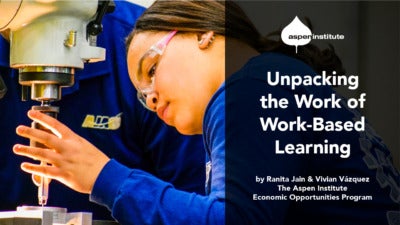
Unpacking the Work of Work-Based Learning
America’s youngest workers, particularly young adults of color, are facing the most dire employment prospects since the Great Depression. As our nation looks toward recovery, and policymakers and investors seek strategies to build stronger connections to economic opportunity for young workers of color, let’s highlight the promise of work-based learning (WBL) opportunities. In a new research report “Unpacking the Work of Work-Based Learning,” Senior Evaluation Manager Ranita Jain and Research Associate Vivian Vázquez describe how four organizations involved with the Annie E. Casey Foundation’s Generation Work initiative—Aerospace Joint Apprenticeship Committee in Seattle, District 1199C Training & Upgrading Fund in Philadelphia, Goodwill of Central and Southern Indiana in Indianapolis, and PowerCorpsPHL in Philadelphia—engage with young adults and employers to design and manage WBL opportunities. WBL can help young adults of color get the experience, education, credentials, and relationships necessary to succeed in the workforce, now and in the future. And it can provide them an entry point into jobs in industries where they have been historically underrepresented. Read the report.
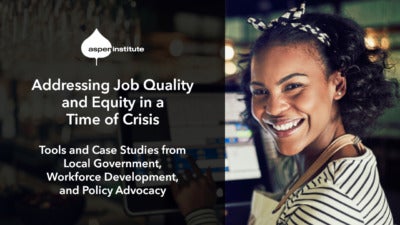
Addressing Job Quality and Equity in a Time of Crisis
As we look to recover from our intersecting crises, ensuring that more jobs are quality jobs will be essential to a sustainable recovery. On February 24, we hosted a webinar on “Addressing Job Quality and Equity in a Time of Crisis: Tools and Case Studies from Local Government, Workforce Development, and Policy Advocacy.” The conversation explored how quietly courageous leaders in city government, policy advocacy, and workforce development are innovating to improve the quality of jobs in their communities. We were pleased to draw on the experiences of Grace Heffernan (Thomas P. Miller and Associates), Mariko Lockhart (Seattle Office for Civil Rights), and Sharmili Majmudar (Women Employed), whose organizations contributed valuable resources to our Job Quality Tools Library. Watch, listen, and learn more.
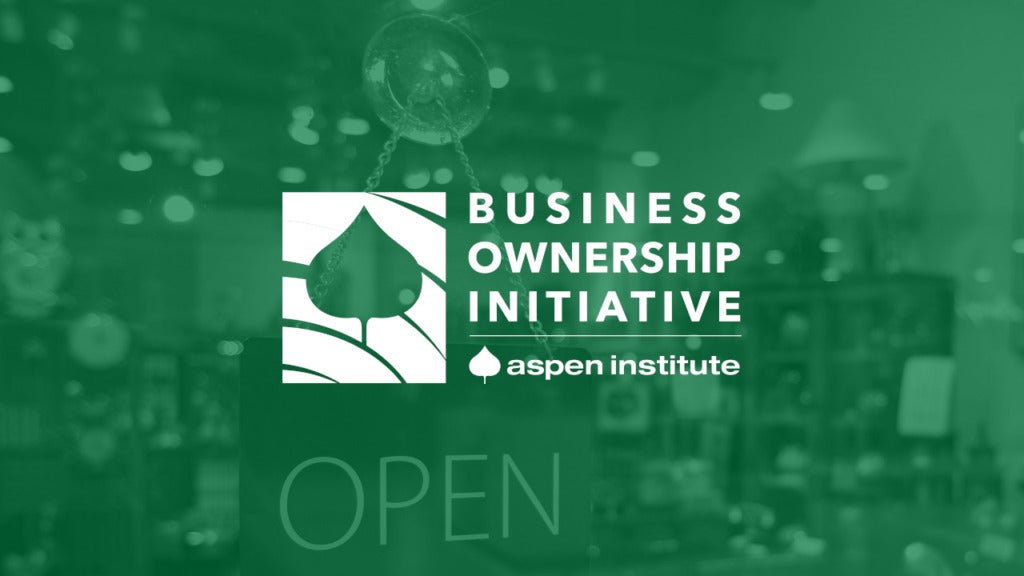
BOI Steps into New Learning Communities
In February, the Business Ownership Initiative launched work with two learning communities. BOI is now facilitating the Initiate Learning Community, a group of 15 CDFIs and small business support organizations that are using the Initiate Prosperity platform of business resources to support their technical assistance activities. And we launched a new learning community among the Mastercard Center for Inclusive Growth’s global financial security and learning grantees. Our first events for the community focused on the experiences of and lessons learned by organizations implementing digital payments initiatives. These new communities join our longstanding work to build and support the Microfinance Impact Collaborative.
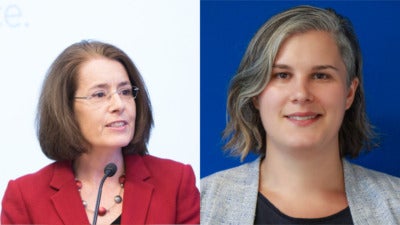
Job Quality Can’t Wait: An Introduction to the Job Quality Tools Library
On February 18, Executive Directory Maureen Conway and Workforce Strategies Initiative Associate Director Jenny Weissbourd joined the Coalition on Adult Basic Education for a webinar entitled, “Job Quality Can’t Wait: An Introduction to the Job Quality Tools Library.” The discussion included why we developed the Library, how to navigate it, and how to use it in your work to strengthen jobs and racial equity for adult learners. Click here to watch.

Precarious Labor in the Gig Economy: In Search of Workplace Security
The platform-based gig economy makes up a small percent of the workforce, but reflects a major shift of risk onto individual workers that has happened across industries in recent decades. This shift has introduced new levels of insecurity to workers’ lives and raised important questions about the future of work. On February 2, Future of Work Initiative Director Shelly Steward took part in a virtual conversation on “Precarious Labor in the Gig Economy: In Search of Workplace Security.” The discussion, hosted by the Lorentzsen Center for Faith and Work, part of the Concordia College Offutt School of Business, featured fellow speakers Joe Raso (Fargo Moorhead Economic Development Corporation) and Willy Solis (Shipt.com; Gig Workers Collective). Click here to watch.
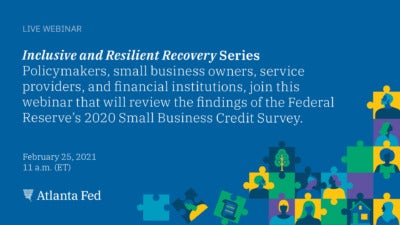
Supporting Small Businesses in the Pandemic and Beyond
On February 25, Business Ownership Initiative Director Joyce Klein participated in a webinar hosted by the Federal Reserve Bank of Atlanta, “Small Business Credit Survey: Findings, Implications, and Opportunities for an Inclusive and Resilient Recovery.” The discussion offered an overview of findings from the 2020 Small Business Credit Survey and a discussion of approaches for an inclusive recovery. Klein spoke alongside Brian Bond (Experian), Ines Hernandez (Citigroup Inc.), Latresa McLawhorn Ryan (Atlanta Wealth Building Initiative), and the Atlanta Fed’s Mels de Zeeuw and Mary Hirt. This webinar was part of the Atlanta Fed’s Inclusive & Resilient Recovery event series.
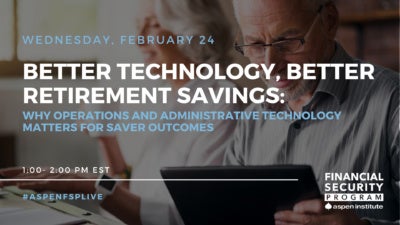
Better Technology, Better Retirement Savings
Millions of workers lack access to retirement savings—and millions more are unable to use savings plans they have access to. How can technology drive better, more equitable savings outcomes for workers? On February 24, the Future of Work Initiative and the Financial Security Program hosted the first event a two-part virtual series exploring how technology can improve workers’ retirement outcomes, “Better Technology, Better Retirement Savings: Why Operations and Administrative Technology Matters for Saver Outcomes.” What must we accomplish with operations and administrative technology to modernize our retirement system, and what’s at stake if we don’t? Click here to learn more.

Updates from UpSkill America
The UpSkill America Leadership Circle convened its first meeting of the year with nearly 30 human resources and learning leaders representing 20 companies participating. The Leadership Circle is made up of companies partnering with UpSkill America to create, expand, or improve education and training opportunities for employees and people in their communities. Participants from companies such as Accenture, The Walt Disney Company, Walmart, and Workday looked at early results from the UpSkill America COVID-19 employment study and shared their goals for 2021. Some of the goals shared by companies included: managing ongoing college degree and certification programs to ensure frontline and entry-level workers have access to them and have the support they need to be successful, all while maintaining costs; digital transformation and digital literacy; building skills for workers and even workers leaving the company; diversity, equity, and inclusion initiatives for leadership, employees, and customers; internal mobility and career pathing (including from nontechnical to technical positions); and education and training around employee wellbeing and worker and customer health and safety.
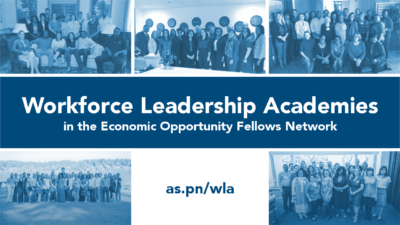
Updates from the Workforce Leadership Academies
The Fellowship application for the Greater Phoenix Workforce Leadership Academy is still open! We are pleased to be partnering with Center for the Future of Arizona in delivering this 10-month leadership fellowship for workforce development professionals in the Greater Phoenix area. The purpose of the Academy is to develop the knowledge and networks of workforce development leaders in ways that build a more effective workforce system across sectors. Fellows in the Academy are dynamic, senior leaders from a range of organizations, all with a shared interest in sparking systems changes that strengthen the local labor market. Click here to learn more about the Academies. If you are interested joining this national network of workforce development leaders and becoming a Fellow of the Greater Phoenix Workforce Leadership Academy, please apply here by March 5!
Upcoming Events
EOP will continue to host virtual events and webinars this season. Join our mailing list and follow us on social media to learn when new opportunities are available.
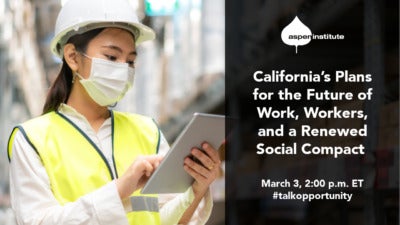
March 3: California’s Plans for the Future of Work, Workers, and a Renewed Social Compact
As the nation grapples with economic inequities that have been growing for decades and exacerbated by the pandemic, how can we ensure that workers of every race, ethnicity, geography, and gender can support themselves and their families? California’s Future of Work Commission, established before the pandemic, has been tasked with confronting this question. Join us on Wednesday, March 3, from 2:00-3:15 p.m. ET (11:00 a.m.-12:15 p.m. PT) for a discussion on “California’s Plans for the Future of Work, Workers, and a Renewed Social Compact,” featuring the state’s labor secretary and commission chairs. Speakers include Mary Kay Henry (International President, Service Employees International Union), James Manyika (Senior Partner, McKinsey & Company; Chairman and Director, McKinsey Global Institute), Julie Su (Secretary, California Labor and Workforce Development Agency), and moderator Eduardo Porter (Economics Reporter, The New York Times). Register now.
Join the conversation
Follow EOP on social media to join the conversation!
-Workforce Strategies Initiative @AspenWorkforce
-Business Ownership Initiative @Aspen_BOI
-UpSkill America @upskillamerica
-Future of Work Initiative @AspenFutureWork
About EOP
The Aspen Institute Economic Opportunities Program (EOP) advances strategies, policies, and ideas to help low- and moderate-income people thrive in a changing economy. We recognize that race, gender, and place intersect with and intensify the challenge of economic inequality and we address these dynamics by advancing an inclusive vision of economic justice. For over 25 years, EOP has focused on expanding individuals’ opportunities to connect to quality work, start businesses, and build economic stability that provides the freedom to pursue opportunity. For more information, visit as.pn/eop.
EOP has several initiatives, including the Business Ownership Initiative, Workforce Strategies Initiative, UpSkill America, Good Companies/Good Jobs, and the Future of Work Initiative. In addition, across these approaches EOP hosts the Economic Opportunity Fellows Network and the Opportunity in America event series.
Thank you to our many partners and funders for supporting our efforts.
Support Our Work
We are committed to making our events and publications freely available to everyone who finds them useful. But if you find value in our work and are able to support it, please consider making a tax-deductible donation. Click here to learn more.
Keep in Touch
Click here to join our mailing list. For updates every day, follow us on social media.

